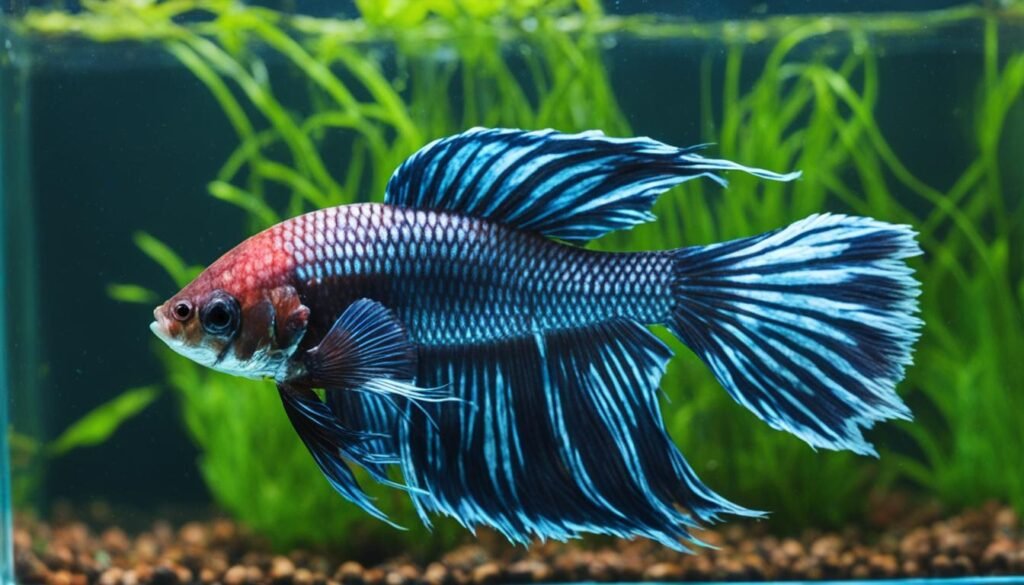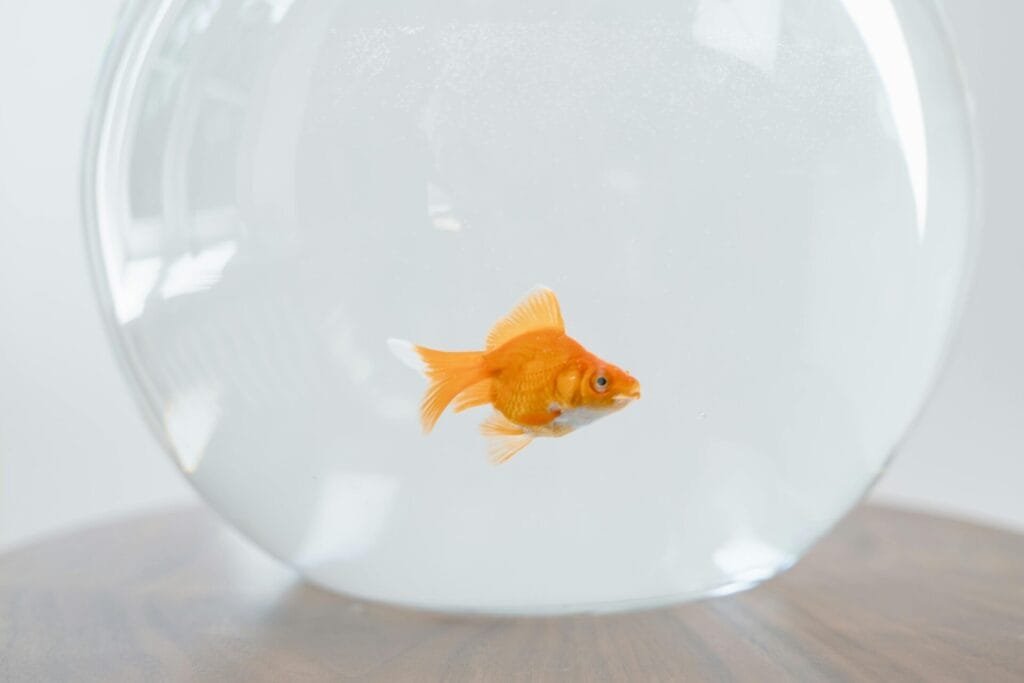Potential Consequences of Underfeeding or Overfeeding Betta Fish
Feeding habits play a crucial role in the overall health of betta fish. Both underfeeding and overfeeding can have detrimental effects on these beautiful creatures. Let’s explore the potential consequences of these feeding practices:
Underfeeding Betta Fish
Underfeeding betta fish can lead to various health issues and negatively impact their well-being. Some of the potential consequences include:
- Starvation: Lack of sufficient food can deprive betta fish of essential nutrients, leading to malnourishment and weakness.
- Weakened immune system: Inadequate nutrition weakens the immune system, making betta fish more susceptible to diseases and infections.
- Stress and lethargy: Underfed betta fish may exhibit signs of stress, become lethargic, and lose their vibrancy.
- Increased susceptibility to diseases: A weakened immune system due to underfeeding makes betta fish more prone to various health issues.
Overfeeding Betta Fish
While it’s important to ensure your betta fish receives enough food, overfeeding can also have negative consequences. Here are some potential issues associated with overfeeding:
- Obesity: Excessive food consumption can cause betta fish to become overweight, leading to obesity-related health problems.
- Bloating and constipation: Overfeeding can result in bloating and constipation, causing discomfort and impacting the overall well-being of betta fish.
- Polluted water and decreased water quality: Excess uneaten food can decompose in the tank, leading to a buildup of waste products, increased ammonia levels, and decreased water quality.
- Various health issues: Poor water quality due to overfeeding can contribute to fin rot, bacterial infections, and other health complications in betta fish.
It’s crucial to strike a balance and provide your betta fish with the right amount of food to maintain their health and well-being. By establishing a proper feeding routine and monitoring their behavior and appearance, you can ensure they receive adequate nutrition without over or underfeeding them.
| Feeding Practices | Consequences |
|---|---|
| Underfeeding | Starvation, weakened immune system, stress, lethargy, increased susceptibility to diseases |
| Overfeeding | Obesity, bloating, constipation, polluted water, decreased water quality, various health issues |
Tips for Feeding Your Betta Properly
Feeding your betta fish a proper and nutritious diet is essential for their overall health and well-being. By following these tips, you can ensure that your betta fish receives the right amount of food and nutrients.
1. Small, Regular Meals
The key to proper betta fish feeding is to provide small, regular meals throughout the day. This mimics their natural feeding behavior and helps prevent overfeeding or underfeeding. Instead of a single large meal, divide their daily food portion into several smaller feedings.
2. High-Quality, Varied Diet
Offer a balanced diet that consists of high-quality betta fish foods. This should include both dry and wet options to provide a variety of nutrients. Look for commercial betta fish pellets or flakes that are specifically formulated for their dietary needs. Additionally, supplement their diet with occasional treats like brine shrimp or bloodworms to add variety and essential proteins.
3. Follow a Feeding Schedule
Establishing a feeding schedule is crucial for maintaining optimal nutrition and preventing overfeeding or underfeeding. Aim to feed your betta fish once in the morning, once in the afternoon, and once in the evening. Adjust the portion size based on their appetite and observe their behavior to ensure they are not being overfed or leaving food uneaten.
4. Observe and Adjust
Pay attention to your betta fish’s eating habits and adjust their feeding regimen accordingly. If they consistently leave food uneaten, reduce the portion size to avoid waste and keep the water clean. On the other hand, if they eagerly consume all the food and still appear hungry, slightly increase the portion size.
5. Don’t Overfeed
Overfeeding betta fish can lead to obesity, bloating, and various health issues. Uneaten food can also contribute to poor water quality and pollution. Remember to feed them an amount they can consume within 2-3 minutes and remove any uneaten food promptly to maintain a clean and healthy environment.
| Proper Betta Fish Feeding Tips | Feeding Schedule for Betta Fish | Betta Fish Diet | Betta Fish Nutrition |
|---|---|---|---|
| Feed small, regular meals throughout the day | Establish a consistent feeding schedule | Provide a variety of high-quality foods | Ensure a balanced and nutritious diet |
| Avoid overfeeding to prevent obesity and bloating | Observe their eating habits and adjust accordingly | Supplement with occasional treats like brine shrimp or bloodworms | Offer essential proteins and nutrients |
| Remove any uneaten food promptly | Prevent waste and maintain water quality |
By following these betta fish feeding tips and maintaining a consistent feeding schedule, you can ensure that your betta fish receives the proper nutrition they need to thrive. Remember to observe their behavior and adjust their diet as necessary to promote optimal health and well-being.
How to Keep Your Betta Healthy While You’re Away
When you’re away on vacation or temporarily unable to tend to your betta fish, it’s essential to ensure their well-being. Proper care during your absence can help maintain your betta fish’s health and happiness. Here are some tips to keep your betta fish healthy while you’re away:
- Use an automatic fish feeder: Automatic fish feeders are a convenient and reliable option for feeding your betta fish while you’re away. These feeders dispense small amounts of food at regular intervals, simulating their natural feeding routine. Choose a high-quality feeder that allows you to calibrate the portions correctly, ensuring your betta fish is not overfed.
- Test the automatic fish feeder: Before leaving, it’s crucial to test the automatic feeder to ensure it functions correctly. Fill the feeder with the appropriate fish food and observe its dispensing mechanism. This step ensures that the feeder will work as intended and provide your betta fish with the necessary nutrition.
- Consider assistance from someone trustworthy: If possible, ask a reliable friend, family member, or neighbor to check on your betta fish and tank periodically. Instruct them on how to feed your betta fish properly and inform them about any specific care requirements.
- Maintain a stable environment: To promote your betta fish’s well-being, conduct a partial water change before leaving. This helps maintain good water quality and reduces the risk of adverse effects during your absence. Additionally, ensure your betta fish’s tank is properly set up with the appropriate filtration system and water parameters.
Incorporating these tips into your betta fish care routine while you’re away will help ensure the health and happiness of your fish. By providing proper nutrition, testing equipment, arranging periodic check-ins, and maintaining a stable environment, you can enjoy your time away while knowing your betta fish are well taken care of.
| Benefits | Considerations |
|---|---|
| Convenient and reliable option | Proper calibration to avoid overfeeding |
| Ensures regular feeding intervals | Testing the feeder for functionality |
| Assistance from someone trustworthy | Proper instructions for caretaker |
| Maintains good water quality | Partial water change before leaving |
| Reduces risk of adverse effects | Proper tank setup and water parameters |
Importance of Water Temperature for Betta Fish
Proper water temperature is crucial for the health and well-being of betta fish. These tropical fish thrive in water temperatures between 76-81 degrees Fahrenheit. Maintaining the right temperature in your betta fish tank is essential to ensure their overall health and happiness.
To achieve and maintain the ideal water temperature, it is important to use a reliable and adjustable aquarium heater. A heater will help regulate and stabilize the temperature within the desired range, providing a comfortable environment for your betta fish.
Before leaving your home or going on vacation, it is crucial to check the functionality of your heater. Ensure that it is working properly and set at the appropriate temperature. This precautionary step will help prevent any unexpected temperature fluctuations while you’re away.
Additionally, it is important to avoid exposing your betta fish tank to extreme temperatures or direct sunlight. Extreme heat or cold can be detrimental to your fish’s health and may lead to stress or even death. Place your tank in a location away from direct sunlight and away from any heating or cooling sources that may affect the water temperature.
Benefits of Maintaining Proper Water Temperature:
- Optimal Health: Betta fish thrive in warm water, and maintaining the recommended temperature range promotes their overall health and vitality.
- Disease Prevention: Consistent water temperature helps boost the immune system of betta fish, making them less susceptible to diseases.
- Healthy Metabolism: The right water temperature ensures that your betta fish’s metabolism functions properly, aiding digestion and absorption of nutrients.
- Increased Activity: Bettas are more active and display their vibrant colors when they are comfortable in their environment with the right water temperature.
By prioritizing the water temperature in your betta fish tank and providing a consistent and appropriate environment, you are taking a significant step towards ensuring the well-being and longevity of your betta fish.
The Role of Water Quality in Betta Fish Care
Maintaining clean water is crucial for the health and well-being of your betta fish. Poor water quality can lead to stress, diseases, and even death. In this section, we will discuss the importance of betta fish tank water quality, betta fish tank filtration, maintaining clean water for betta fish, and the significance of betta fish water changes.
Betta Fish Tank Water Quality
Creating and maintaining optimal water quality is essential for the overall health and happiness of your betta fish. To ensure clean water, follow these important steps:
- Begin by thoroughly cleaning the tank before adding water and fish. Remove any debris, dirt, or dust that may have accumulated.
- Next, add a suitable water conditioner to remove chlorine, chloramines, and heavy metals from the tap water. This will help provide a safe and healthy environment for your betta fish.
- Monitor the levels of ammonia, nitrite, and nitrate regularly using a reliable test kit. High ammonia levels can be toxic to betta fish and can cause ammonia poisoning, leading to severe health problems. Nitrite and nitrate levels should also be kept within acceptable ranges to prevent stress and illness.
- Perform regular partial water changes to remove accumulated waste, excess food, and other pollutants. Smaller tanks require more frequent water changes, while larger tanks with proper filtration can maintain good water quality for extended periods. Aim for weekly water changes of 25-30% for optimal results.
Betta Fish Tank Filtration
A good filtration system plays a vital role in maintaining clean water for your betta fish. The filtration system helps remove debris, excess food, and fish waste, ensuring a healthy and stable aquatic environment. Consider the following when choosing a filtration system:
- Choose a filter that is suitable for your tank size. Different filters have different flow rates and filtration capacities, so select one that can adequately handle the volume of your tank.
- Opt for a filter with adjustable flow settings. Betta fish prefer gentler water movement, so having the ability to adjust the flow helps create a more comfortable environment for them.
- Regularly clean and maintain the filter according to the manufacturer’s instructions. Over time, the filter media can become clogged with debris, reducing its effectiveness. Cleaning and replacing the filter media as needed will ensure optimal performance.
Betta Fish Water Changes
Regular water changes are essential for maintaining high water quality in your betta fish tank. They help remove accumulated toxins, waste, and pollutants, reducing the risk of waterborne diseases and health issues. Here are some important guidelines for betta fish water changes:
- Perform partial water changes on a regular basis. For smaller tanks, aim for weekly water changes of 25-30% of the total volume. Larger tanks with efficient filtration may require less frequent water changes.
- Before starting a water change, ensure that the new water is properly conditioned and has the same temperature as the tank water to avoid temperature shock.
- When siphoning water during a water change, be careful not to disturb the substrate excessively, as this can release debris and particles back into the water column.
- While performing a water change, take the opportunity to inspect the tank for any signs of illness, damage, or abnormalities. This allows you to address any potential issues promptly.
Regular water changes, proper water conditioner usage, and regular filter maintenance are key to ensuring excellent water quality in your betta fish tank. By maintaining clean water, you provide a safe and healthy environment for your betta fish, promoting their overall well-being.
| Benefit | Importance |
|---|---|
| Promotes overall health and well-being | Essential for the long-term health and happiness of your betta fish |
| Reduces the risk of diseases | Clean water helps prevent the development and spread of bacterial, fungal, and parasitic infections |
| Enhances water clarity and aesthetics | Clean water allows for better visibility, showcasing the natural colors and beauty of your betta fish |
| Improves oxygen levels | Clean water facilitates the exchange of oxygen and helps maintain optimal oxygen levels for your betta fish |
Maintaining Normal Day/Night Cycles for Your Betta Fish
Proper day/night cycles are essential for the health and well-being of your betta fish. Just like any other living creature, betta fish have natural rhythms that follow a day and night pattern. By mimicking these cycles in their environment, you can help maintain their routine and overall health.
To create a balanced day/night routine for your betta fish, follow these helpful tips:
- Set timers for tank lights: Invest in a timer for your tank lights to accurately simulate natural day and night cycles. This ensures that your betta fish receives the right amount of light exposure during the day and darkness at night. Aim for 8-10 hours of light during the day and a completely dark tank at night to replicate their natural habitat.
- Avoid direct sunlight: Keep the tank away from direct sunlight or areas with intense artificial lighting. Excessive exposure to light can disrupt the day/night cycles of your betta fish and impact their routine.
- Avoid complete darkness: While darkness is important during the night phase, it is crucial to create a gentle ambience rather than complete darkness. This helps your betta fish distinguish between day and night and ensures their routine remains consistent.
Creating a proper day/night cycle for your betta fish is not only important for their physical health but also for their mental well-being. It helps regulate their sleep patterns, digestion, and overall behavior. Maintaining their routine contributes to a happy and stress-free betta fish.
Conclusion
Ensuring the well-being of your betta fish during your absence is crucial. By taking proactive measures and following these betta fish care tips, you can ensure their health and happiness even when you’re away.
Plan ahead by selecting the best feeding method for your betta fish. Whether it’s arranging for a trusted fish sitter, investing in an automatic feeder, or using a block feeder, make sure your fish receives the necessary nutrition.
Additionally, maintaining water quality is essential. Conduct a partial water change and ensure your betta fish’s tank has proper filtration to keep the water clean and free from harmful toxins. Don’t forget to use a water conditioner to remove any traces of ammonia.
Finally, ensure that your betta fish experiences a natural day/night cycle. Set timers for the tank lights, providing 8-10 hours of light during the day and darkness at night. This mimics their natural habitat and helps maintain a balanced routine for your fish.
With these betta fish care tips in mind, you can be confident that your fish will stay healthy and happy even when you’re away.


